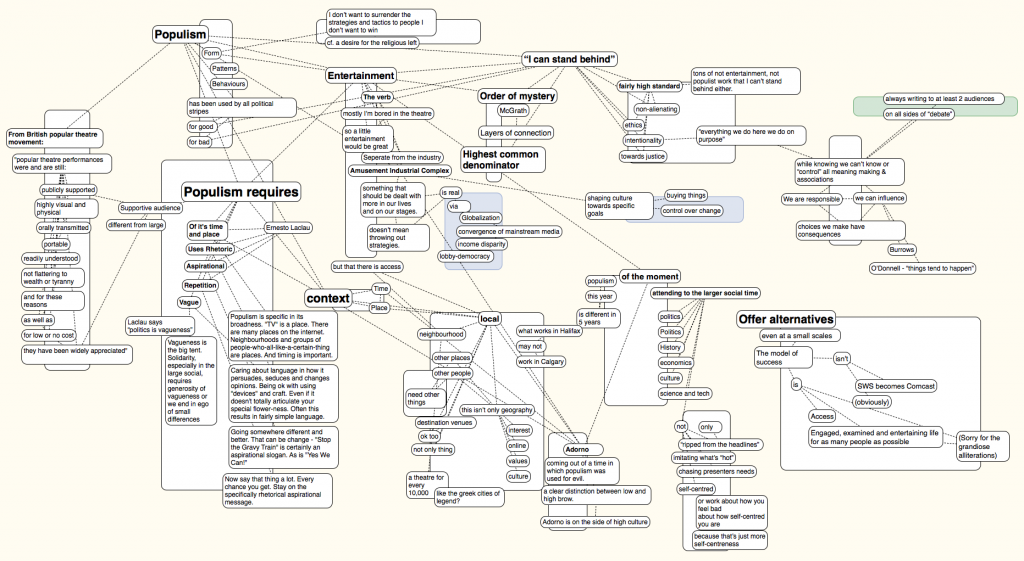
For a while now I’ve been thinking and working from a question of finding “A populism I can stand behind.” [1]
These are hard days for populism – it’s getting called out for a lot. Specifically, a combination of the Fords (who are totally populist), Andrea Horwath’s campaign for the NDP and in “what’s wrong with Canadian theatre” conversations.
In the last two, the distinction between populist and middle-of-the-road is missing but very important. They are different – not necessarily mutually exclusive, but different. The malaise in both Horwath and the theatre feel more about middle-of-road-ness that populist.
I’m in favour of populism – or at least want to complicate and include it in my work making theatre and stuff.
The outline
Populism
- is a form
- a set of patterns
- and behaviours
- has been used
- by all political stripes
- for good
- for bad
- I don’t want to surrender
- strategies
- tactics
- to people I don’t want to win
- cf. a desire for the religious left
Populism requires:
- Supportive audience
- different from large
- from Ernesto Laclau :
- Argentine political thinker. 1935–2014
- Of it’s time and place.
- Populism is specific in its broadness. “TV” is a place. There are many places on the internet. Neighbourhoods and groups of people-who-all-like-a-certain-thing are places. And timing is important.
- Uses Rhetoric
- Caring about language in how it persuades, seduces and changes opinions. Being ok with using “devices” and craft. Even if it doesn’t totally articulate your special flower-ness. Often this results in fairly simple language.
- Aspirational
- Going somewhere different and better. That can be change – “Stop the Gravy Train” is certainly an aspirational slogan. As is “Yes We Can!”
- Vague
- Vagueness is the big tent.
- Solidarity, especially in the large social, requires generosity of vagueness
- or we end in ego of small differences
- Laclau says “politics is vagueness”
- Repetition
- Now say that thing a lot.
- Every chance you get.
- Stay on the specifically rhetorical aspirational message.
From British popular theatre movement:
- “popular theatre performances were and are still:
- publicly supported,
- highly visual and physical,
- portable,
- orally transmitted
- readily understood
- not flattering to wealth or tyranny
- and for these reasons, as well as
- for low or no cost,
- they have been widely appreciated”
There’s also been some “entertainment” bashing – which is related.
Entertainment
- (mostly I’m bored in the theatre
- so a little f*ing entertainment would be great.)
- but seriously.
- Interested in
- The verb: to entertain
- “Good night out”
- Separate from the industry
- Amusement Industrial Complex is real.
- via
- Globalization
- convergence of mainstream media
- income disparity
- lobby-democracy
- we’re moving towards specific goals[2]
- something that should be dealt with more in our lives and on our stages.
- doesn’t mean throwing out strategies.
A common response is that populism and entertainment = lowest common denominator.
Why not
- Highest common denominator
- Orders of mystery
- John McGrath
- A whole other map writing thing.
- Layers of connection and meaning
- That different people get different things
By working in Context
of the moment
- populism
- this year`
- is different in 5 years
- attending to the larger social time
- politics
- Politics
- History
- economics
- culture
- science and tech
- etc…
- not
- only / always
- imitating what’s “hot”
- “ripped from the headlines”
- chasing presenters needs
- self-centred
- or work about how you feel bad about how self centred you are
- because that’s just more self centredness
Local:
- neighbourhood
- destination venues
- ok too
- not only thing
- this isn’t only geography
- interest
- online
- values
- culture
- other places
- other people
- need other things
- what works in Halifax
- may not
- work in Calgary
- perhaps
- a theatre for every 10,000
- like the greek cities of legend?
Offer alternatives
- even at a small scales
- the model of success
- isn’t
- SWS becomes Comcast
- (obviously)
- SWS becomes Comcast
- is:
- Access,
- Engaged, examined and entertaining life for as many people as possible (Sorry for the grandiose alliterations)
If populism is not an ideological position [3], then “I can stand behind” becomes the ideological content. [4]
“I can stand behind”
- Means:
- away from alienation [5]
- towards justice
- ethics, both in the making and the doing.
- intentionality
- “everything we do here we do on purpose”
- while knowing we can’t know or “control” all meaning making & associations. [6]
- We can influence perception
- We are responsible
- Choices we make have consequences
- Jonathan Burrows in Choreographer’s Handbook
- Darren O’Donnell and The Tendency Group – “things tend to happen”
- (There is tons of not-entertainment, not-populist work that I can’t stand behind either. See SWS podcast re: checking your gender politics at the door of Canadian theatre.)
Again, my desire is to offer alternatives – I hope that in these offers I can find something more hopeful and possible in these dark times.
- I’ve crystallized been thinking about popular forms and my interest in them for many years. It was the Toronto Fringe Festival Research Chair opportunity that gave me time for reading and thinking that crystallized some of this work. Thanks Gideon and Fringe. You can watch the talk here. ↩
- Goals that include: buying things and control over change. ↩
- Except in the way that it is, of course. ↩
- And remember kids, “I’m not political.” = “In favour of the status quo.” ↩
- Another position I want to wrap in subjectivity but also exists. ↩
- This is a point I am aware of writing for (at least) two audiences in which this is a point of contention. Now isn’t the time. ↩









